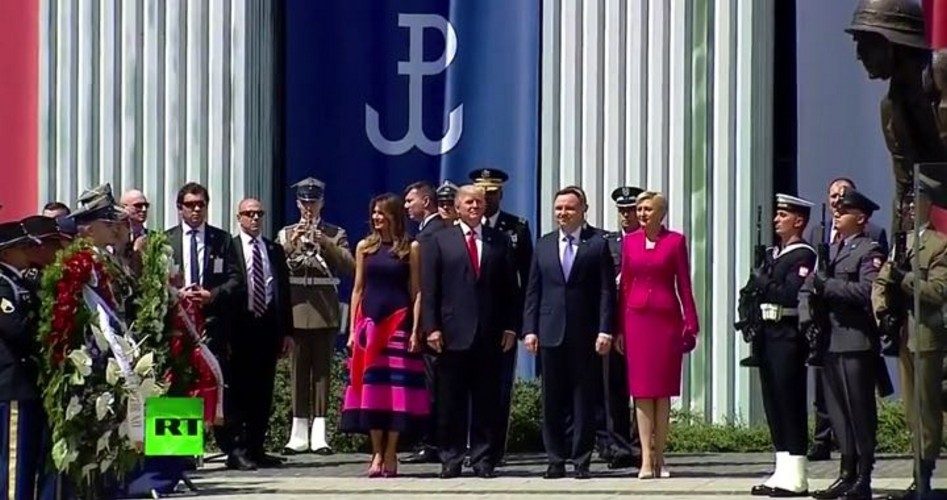
Despite defending Western values, nationhood, and Christianity in his historic July 6 speech in Warsaw, Poland, President Donald Trump also made a number of remarks appearing to subtly promote U.S. intervention overseas, as well as entangling alliances with transnational institutions. Some of the rhetoric — full-blown support for NATO, for example, or demanding that the Kremlin stop aiding the Syrian regime in its war against Islamist rebels — marked a sharp contrast with his anti-globalist campaign speeches promoting largely noninterventionist views and “America First” policies. But what the changing rhetoric means from a policy perspective remains to be seen.
Support for NATO and the “Transatlantic” alliance between “Europe” and the United States were key themes in Trump’s speech. “You were supported in that victory over communism by a strong alliance of free nations in the West that defied tyranny,” Trump said after describing heroic Polish efforts to resist National Socialist (Nazi) and International Socialist (Soviet) oppression. “Now, among the most committed members of the NATO Alliance, Poland has resumed its place as a leading nation of a Europe that is strong, whole, and free.”
While Trump never said it explicitly, a number of his comments were interpreted by some analysts as an endorsement of the globalist European Union, which Trump ridiculed and slammed on the campaign trail as he fervently supported British secession. “A strong Poland is a blessing to the nations of Europe, and they know that,” Trump said. “A strong Europe is a blessing to the West and to the world. One hundred years after the entry of American forces into World War I, the transatlantic bond between the United States and Europe is as strong as ever and maybe, in many ways, even stronger.”
Again, without saying it explicitly, Trump appeared to be endorsing a key globalist theme that, a few generations ago, was happening much more openly — the establishment-engineered unification of Europe on the road to a “Transatlantic” union, finally paving the way toward world federalism and true globalism under the banner of a “New World Order.” While the movement has changed some of its rhetoric, the goals remain the same. And through the proposed Transatlantic Trade and Investment Partnership (TTIP), the goal of installing transnational policymakers over the economies of the United States and the EU is no longer a remote prospect.
Under the controversial scheme, unelected EU bureaucrats would be empowered to impose policies on Americans. Transnational “tribunals” would also have the power to override American courts and elected officials. And despite fading from the forefront of public discussion in the press, U.S. Commerce Secretary Wilbur Ross, a former Rothschild operative, recently told an audience in Berlin that the U.S. government remained open to imposing the “free trade” regime on America and Europe. German Chancellor Angela Merkel, the open-borders fanatic and “former communist,” reportedly welcomed the idea as well.
In his speech from Poland, Trump appeared to endorse the idea, no doubt pleasing globalists in Europe and the United States. “To the citizens of this great region, America is eager to expand our partnership with you,” Trump said, presumably referencing “citizens” of the EU and the TTIP scheme. “We welcome stronger ties of trade and commerce as you grow your economies. And we are committed to securing your access to alternate sources of energy, so Poland and its neighbors are never again held hostage to a single supplier of energy.”
In addition to the subtle nod of support to transnational regimes, Trump also struck a much more militaristic, interventionist tone in the speech. “Today, the West is also confronted by the powers that seek to test our will, undermine our confidence, and challenge our interests,” he said. “To meet new forms of aggression, including propaganda, financial crimes, and cyberwarfare, we must adapt our alliance to compete effectively in new ways and on all new battlefields.” He was referring to NATO.
Trump also said U.S. and Polish troops were serving in Afghanistan and Iraq supposedly “combating the enemies of all civilization,” though on the campaign trail he regularly denounced the Iraq War.
And then, despite having stated repeatedly before his election that the U.S. government should stay out of Syria and avoid confrontation with the Kremlin if possible, Trump seemed to have succumbed, at least partly, to the swarms of globalist swamp creatures burrowed in his administration on both issues. “We urge Russia to cease its destabilizing activities in Ukraine and elsewhere, and its support for hostile regimes — including Syria and Iran — and to instead join the community of responsible nations in our fight against common enemies and in defense of civilization itself,” Trump said.
With all of that in mind, Trump touted the increasing monetary support for NATO provided by other governments thanks to prodding by the new U.S. administration. “As a result of this insistence, billions of dollars more have begun to pour into NATO,” he said. “In fact, people are shocked. But billions and billions of dollars more are coming in from countries that, in my opinion, would not have been paying so quickly.”
On the campaign trail, though, Trump referred to NATO, which is a subsidiary of the United Nations and is typically used to enforce UN decrees, as “obsolete.” But since his election, he has radically shifted his position. “To those who would criticize our tough stance, I would point out that the United States has demonstrated not merely with words but with its actions that we stand firmly behind Article 5, the mutual defense commitment,” Trump said, despite having advocated repeatedly for a constitutional declaration of war from Congress prior to committing U.S. forces. Article 5 of the pact purports to commit U.S. troops to war whenever another NATO member is attacked.
Finally, Trump praised Poland for acquiring Patriot air and missile defense systems from the United States, and also for being among the first NATO member states to achieve the benchmark for “investment in our common defense.” “Thank you, Poland,” Trump said. “I must tell you, the example you set is truly magnificent, and we applaud Poland.”
The president, who was greeted as a hero in Poland, also said that America had never, and would never, give up on “freedom and independence as the right and destiny of the Polish people.” Unfortunately, Trump has probably not read the explosive book I Saw Poland Betrayed by former U.S. Ambassador to Poland Arthur Bliss Lane. The book documents, among other horrors, the deliberate post-World War II betrayal of Poland by the very same U.S. and Western foreign-policy establishment — with the Council on Foreign Relations at the center of it — into communist slavery. In fact, the U.S. government, under the influence of establishment globalists whose heirs remain in positions of power to this day, played a crucial role in ensuring that Poland would lose both its freedom and independence to the savage communist tyrants operating out of Moscow.
To his credit, in his historic speech, Trump blasted the “wicked” system of communism, and praised the Christian faith of the Polish people as crucial to overcoming it. He also offered a vigorous defense of Western civilization against those who would subvert and destroy it. However, to truly save liberty, sovereignty, Christendom, and Western civilization, Americans and Poles must reject statism and globalism — including establishment plots and transnational sovereignty-crushing schemes such as NATO, the EU, and the UN. Only then will Western values and freedom truly be safe from those who would subvert them.
Image of Donald Trump: Screenshot of YouTube video released by RT
Alex Newman, a foreign correspondent for The New American, is normally based in Europe. He can be reached at [email protected]. Follow him on Twitter @ALEXNEWMAN_JOU or on Facebook.
Related articles:
In Poland, Trump Cites Faith as Key to Ending “Wicked” Communism
TTIP “Trade” Regime Would Let EU Meddle in U.S. Policy
Some of Trump’s Picks Have Troubling Links to Globalism, CFR
The Real Agenda Behind the CIA Spawning the EU
The EU: Regionalization Trumps Sovereignty
Globalist Gorbachev Defends Putin; USSR Role in EU Revisited
NATO: A Military Entangling Alliance
EU in Final Phase of Destroying Democracy, Czech President Warns
Leaked TTIP Deal to Merge U.S. and EU Triggers Outrage
A Review of “World Federalism 101”
Leaked Obama “Trade” Pact Exposes Assault on Self-government


